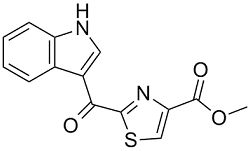All AbMole products are for research use only, cannot be used for human consumption.

ITE is a potent endogenous agonist of aryl hydrocarbon receptor (AhR), which directly binding to AHR with a Ki of 3 nM. ITE potently inhibits human pulmonary artery endothelial (HPAECs) growth at 10 and 20 µM. ITE (20 µM) elevates CYP1A1 and CYP1B1 mRNA levels and decreases the levels of AhR protein in HPAECs.
In vivo, ITE (200 μg, i.p.) significantly suppresses the development of experimental autoimmune uveitis (EAU) in mice. ITE reduces the proportions of cells expressing IFN-γ, IL-17, or IL-10 in mice. ITE also suppresses the secretion of inflammatory cytokines by LN cells in mice.

Cell Death Dis. 2023 Feb 8;14(2):92.
Aryl hydrocarbon receptor dependent anti-inflammation and neuroprotective effects of tryptophan metabolites on retinal ischemia/reperfusion injury
ITE purchased from AbMole
| Molecular Weight | 286.31 |
| Formula | C14H10N2O3S |
| CAS Number | 448906-42-1 |
| Solubility (25°C) | DMSO ≥ 25 mg/mL |
| Storage |
Powder -20°C 3 years ; 4°C 2 years In solvent -80°C 6 months ; -20°C 1 month |
[1] Pang LP, et al. Exp Lung Res. ITE inhibits growth of human pulmonary artery endothelial cells.
| Related Immunology/Inflammation Products |
|---|
| 3-Fucosyllactose
3-Fucosyllactose (3-Fucosyl-D-lactose) is one of the major fucosylated oligosaccharides found in human breast milk. 3-Fucosyllactose shows prebiotic, immunomodulator, neonatal brain development, and antimicrobial function. |
| Aloe Polysaccharide
Aloe Polysaccharides are the primary bioactive components of aloe vera gel, primarily found in the gel-like portion of the aloe vera leaf, specifically the transparent, viscous section enclosed by the leaf epidermis. Aloe polysaccharides are a large class of macromolecular compounds with diverse physiological functions, primarily composed of mannose, galactose, glucose, xylose, arabinose, and rhamnose, with mannose, galactose, and glucose being the most abundant. They exhibit various bioactivities, including antibacterial and anti-inflammatory effects, antiviral activity, immune modulation, antitumour properties, radiation protection, antioxidant properties, and hypoglycaemic effects. |
| Terminalia Chebula Extract
Terminalia Chebula Extract is extracted from Terminalia Chebula, which has antioxidant, hepatoprotective, neuroprotective, cytotoxic, antidiabetic, and anti-inflammatory activities. |
| SMS121
SMS121 is a novel CD36 inhibitor. SMS121 reduced the uptake of fatty acid into AML cells that could be reversed by addition of free fatty acids and caused decreased cell viability. |
| Rolistobart
Rolistobart is a humanized immunoglobulin G4-kappa, anti-LILRB4/CD85k monoclonal antibody. |
All AbMole products are for research use only, cannot be used for human consumption or veterinary use. We do not provide products or services to individuals. Please comply with the intended use and do not use AbMole products for any other purpose.


Products are for research use only. Not for human use. We do not sell to patients.
© Copyright 2010-2024 AbMole BioScience. All Rights Reserved.
